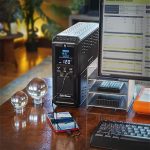Nowadays, power outages have become quite common, and they can be more than just an inconvenience. On the one hand, they can disrupt the working of an appliance, but with the increased usage of UPS (uninterruptible power supply) systems, it is easy to manage them.
A UPS, providing temporary power during outages, acts as a safety net. It allows for a graceful shutdown of equipment or continued operation. But just like any other electrical device, a UPS system uses energy, and optimising its efficiency significantly can offer many advantages.
Let us understand how it gets affected in the first place and a few practical strategies to maximise UPS power supply efficiency.
What do you Understand by UPS Efficiency?
UPS power supply efficiency refers to the percentage of power entering the unit that gets delivered to your equipment during a power outage. Ideally, you would want this number to be as close to 100% as possible. However, some energy is lost during the conversion process within the UPS. By optimising your UPS, you can minimise these losses and improve its overall efficiency.
Factors Affecting the Operational Efficiency of a UPS
There are several factors impacting the efficiency of your UPS power supply system. Some of them are:
1. Load Level
UPS power supplies are most efficient when operating within a specific load range, typically between 30% and 70% of their capacity. Running a UPS at a very low load (under 20%) or overloading it (over 80%) can significantly reduce its efficiency.
2. UPS Technology
Traditional transformer-based UPS systems tend to be less efficient than newer technologies like online double-conversion UPS. Online UPS constantly converts incoming AC power to DC power and then back to AC, resulting in higher energy losses at low load levels.
3. Age and Maintenance
Like any machine, a UPS power supply loses efficiency as it ages. Regular maintenance, including cleaning dust filters and replacing worn-out batteries, can help maintain optimal performance.
4. Environmental Conditions
Extreme temperatures can negatively impact UPS efficiency. Ensure your UPS is placed in a cool, well-ventilated environment within the recommended operating temperature range.
Strategies to Optimise UPS Efficiency
With sound knowledge of practical ways to optimise a UPS system’s efficiency, you can save money on energy bills. It also helps reduce your environmental footprint. Here are some practical steps you can take to improve the efficiency of your UPS power supply:
1. Right-sizing your UPS
Choosing the right size UPS for your needs is crucial. A UPS that is too large will operate at a lower load level, reducing efficiency. Conversely, an undersized UPS might not provide enough power during an outage. Carefully assess the power requirements to choose a UPS.
2. Leverage Eco Mode (if available
Many modern UPS power supplies offer an “Eco Mode” or “Bypass Mode” function. This mode bypasses the internal conversion stages and delivers utility power directly to your equipment, significantly improving efficiency.
3. Regularly Monitor and Analyse the Load
Monitor your UPS power supply’s load levels using its built-in management tools or external monitoring software. Analysing historical data can help you identify periods of low or high load. By strategically distributing your connected equipment, you can keep the UPS operating within the optimal load range for maximum efficiency.
4. Implement Power Management Strategies
Consider implementing power management features on the equipment connected to your UPS. Enabling sleep modes or scheduling power-down periods for non-critical tasks can significantly reduce the UPS’s overall load.
5. Prioritise Preventive Maintenance
Regular preventive maintenance on your UPS power supply is essential for maintaining optimal efficiency. This includes cleaning dust filters, checking battery health, and performing any manufacturer-recommended maintenance procedures.
Making Smart Use of UPS Systems
The performance, reliability, and longevity of your UPS system, ultimately safeguards your critical equipment and operations against power disruptions. Therefore, it is essential to have a UPS power supply system that is bought from a reputed electrical power backup solutions company. This collaborative approach is a proactive strategy to enhance the resilience of your power infrastructure and minimise downtime.
Keeping your business or household powered up when it matters most. Get in touch with a top electrical power backup solutions company today!

“Hardcore pop culture pundit. Gamer. Internet buff. Trouble maker. TV aficionado. Devoted social media aficionado.”









More Stories
BintangChip Semicon Umumkan Ekspansi Fasilitas Produksi, Targetkan Peningkatan Kapasitas 30%
Pelajari cara bermain bingo onlin
Mengapa Banyak Perkelahian Hoki Meletus?